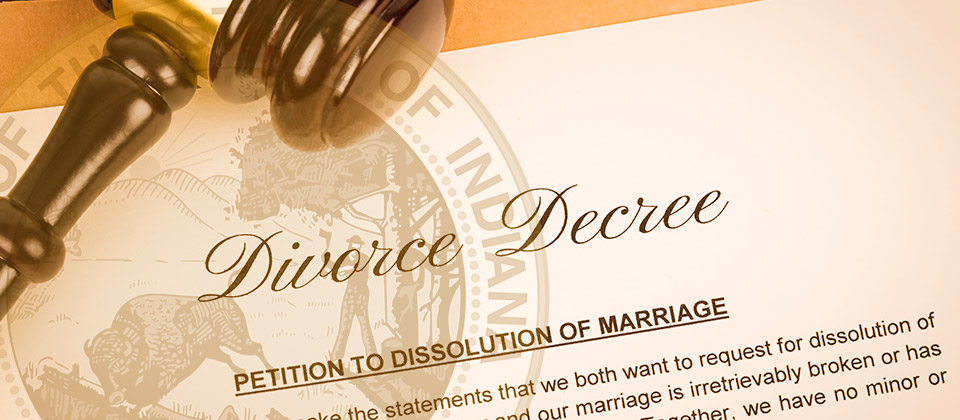Guide to Indiana Divorce Records

Unfortunately, your divorce isn't completely over once the judge signs your divorce decree. Numerous events can follow the final judgment, and you don't always know when they'll pop up. In most cases, you'll need your Indiana divorce records to act as proof or provide context on your divorce.
The problem is that these records are certified by government offices, and getting them promptly can be challenging. This is particularly true if you've moved out of state and mail order is your only option. If you've found yourself needing divorce records from Michigan in a short time frame, it's essential that you get the process right.
What are Indiana Divorce Records?
In Indiana, divorce records are a comprehensive history of a couple's divorce proceedings. Depending on the jurisdiction, they include court transcripts and bank statements and may even show evidence of infidelity.
However, the most important document is the final judgment. This paper is what legally ends the marriage and outlines the ex-spouse's responsibilities to each other.
Basic details on court cases may be found through Indiana's public court database, but the results will lack most supporting documents. If you want a more comprehensive look into a divorce, you'll need to request a certified record through the court clerk's office that finalized the divorce.

What's Inside the Divorce Record?
The particulars of a divorce record will match how convoluted the process was. Some cases will clog entire binders, while others will struggle to fill a manila folder. Despite the massive extent to which divorces will vary, nearly all divorce records will include the following elements:
- Final Judgment: The judge signs this document to signify the legal end of the marriage. At its core, the final judgment is the cover page for the rest of the divorce.
- Affidavit: Family Courts require both spouses to produce a breakdown of their financial statuses. Included information covers financial accounts, life insurance policies, tax information, and outstanding debts.
- Spousal Support: Commonly called alimony, this encompasses each spouse's financial obligations to the other. Indiana doesn't have specific thresholds for when to award alimony but looks at the unique situation between divorcing parties.
- Child Custody: Matters concerning the children's living arrangements, visitation rights, and financial support are outlined here. The courts are attempting to create a clear framework for parental responsibilities in the children's best interests.
- Division of Assets and Debt: Indiana strives to divide property in a "just and reasonable" manner. Most of the time, this results in a nearly equal split between spouses.
Errors in Divorce Records
The divorce process is long, and while the courts are reasonably thorough, mistakes can still fall through. If you want to pursue a correction to your divorce records due to an error, follow these steps:
- Verify the Error: You don't want to start the appeals process only to learn you were mistaken. Gather the relevant documentation and make sure everything supports your claim.
- Contact the other Party: Reaching out to your previous partner may save you a lengthy court process, especially if the asset is small. They may not want to return to court for the contest.
- File for Correction: Contact the court clerk where your divorce was finalized and file a motion for correction. This may be a simple amendment or turn into something bigger. The clerk will lead you through the relevant steps for their county.
Divorce Statistics in the State

Understanding the reasons and rates for successful marriages in a state is crucial to pushing social programs in the right direction. These statistics provide meaningful insight into families' challenges and when they're most likely to break.
Some of the most critical divorce statistics include:
- Divorce Rate: Indiana is one of five states that doesn't report divorce data to the Centers for Disease Control. State research says that Indiana has a divorce rate of 9.96 per 1000 women over 15 years old.
- Reported Reasons for Divorce: Indiana is a no-fault divorce state. This means couples don't have to prove blame to qualify. In most cases, the most cited reason for Indiana divorces is the irretrievable breakdown of the marriage.
USA Today published a list of cities with the highest divorce rates in America. Among this list, Indiana had a disproportionate number of entries and held 3 out of the 25 slots. Those cities were:
- #4. Anderson, Indiana
- #7. Evansville, Indiana
- #25. Richmond, Indiana
How to Find Indiana Divorce Records

Your chosen method depends on whether you need an official or unofficial version of your divorce records. Some people search for court records for personal or genealogical use rather than to complete a legal or financial task.
If you don't need certified records, you can get unofficial copies of court documents through the Indiana Judicial Branch's online case platform. For this option, you'll need one or all of the following details:
- Case number/Citation number/Cross reference number
- Full legal name and birthday of one of the divorcees
- Full name or barn number of one of the attorneys
Offline Divorce Records
The complete divorce files are only found in the county that finalized the divorce. They're kept by the clerk of court or the court's records management division. You can fetch the records in person or send a mail request; each has its benefits.
Personally visiting the courts will help ensure you do everything right. You can ask for the correct forms and payment method and assist in locating the case if the representative has trouble. You'll likely walk out that day with certified records in your hands.
There are minute differences in how counties process requests, but your responsibilities don't change. We recommend bringing the following items to avoid potential problems:
- Unexpired photo ID
- Relation to the named parties
- Names of parties before and after divorce
- Divorce court case number
- Date of divorce
Mail-in requests are perfect for people who aren't on a time crunch and have moved since their divorce. Many people choose to leave their original county due to bad memories from the divorce, so going to the courts in person isn't an option.
Each county uses its own request form for vital records. However, you'll be fine as long as you say what you're looking for and how to find it. Just include the details we listed in the bullet list above.
Aside from the basic search information, you should enclose a photocopy of your ID and a check or money order payable to the county court. We can't provide a definitive fee charged by all counties, but you should expect to pay anywhere from $10 to $25. This cost includes the search fee, certification fee, and shipping costs.
Online Divorce Records
A select few Indiana counties offer online record requests. One of the best examples is Marion County's platform, which provides information on public safety, police administration, and government cases.
The quickest way to check if your county offers a similar service is to visit their county clerk's homepage or call their offices directly.
Indiana Court Clerk Contact Directory
Navigating government websites is tricky, and getting a response through email isn't guaranteed or timely. To ensure you're speaking to the right people, you must call the county clerk instead of a general office number.
| County | Clerk Name | Phone Number |
|---|---|---|
| Marion County | Kate Sweeney Bell | (317) 327-4720 |
| Lake County | Michael A. Brown | (219) 755-3460 |
| Allen County | Christopher M. Nancarrow | (260) 449-7245 |
| Hamilton County | Kathy Kreag Williams | (317) 776-9629 |
| St. Joseph County | Amy Rolfes | (574) 235-9635 |
| Elkhart County | Christopher Anderson | (574) 535-6430 |
| Tippecanoe County | Julie Roush | (765) 423-9326 |
| Vanderburgh County | Carla Hayden | (812) 435-5160 |
| Hendricks County | Marjorie Pike | (317) 745-9231 |
| Johnson County | Trena McLaughlin | (317) 346-4450 |
FAQ on Divorce Records in Indiana
Why do I need a certified divorce record?
You might not need a certified copy. Some administrative tasks, like updating a life insurance policy, don't require a certified divorce decree. You can get away with requesting a verification letter from Indiana's vital records department.
Certified divorce decrees become non-negotiable when engaging in legal or governmental processes. Your marital status greatly impacts many Federal programs that are constantly wary of fraud.
Do I need my divorce records to remarry in Indiana?
This will change by county. Some places only require you to provide the date your marriage ended, and they'll look up your records themselves. Others demand you bring a certified divorce decree alongside your marriage license application.
Being ready for these situations is why we recommend keeping a copy of your divorce records on hand, even if you don't need them immediately.
Do I have to pay a fee to get my divorce record in Indiana?
County courts charge search and certification fees when providing divorce records. Most county offices will charge for the certified divorce decree and add an extra charge for additional pages from the case file.
So, the cost of your complete divorce record varies based on the case's complexity. However, most people expect to pay somewhere from $10 to $25 for everything. Unofficial records from the Judicial Branch's online case platform do not currently have a fee attached.
How long do I have to wait before getting my divorce record?
Most Indiana counties have a 60-day lapse from the final judgment to adding it to their database. This means you can't access your divorce records during this period, even in an unofficial capacity.
However, you can get your record earlier if you visit the courts in person. They should have it on file, even if it hasn't been uploaded to their library.
Can anyone request a divorce record in Indiana?
Indiana divorce records are public information, but many essential documents aren't accessible without good reason. . Authorized persons include the named divorcees, direct family, future spouses, and people with a provable legal interest.
